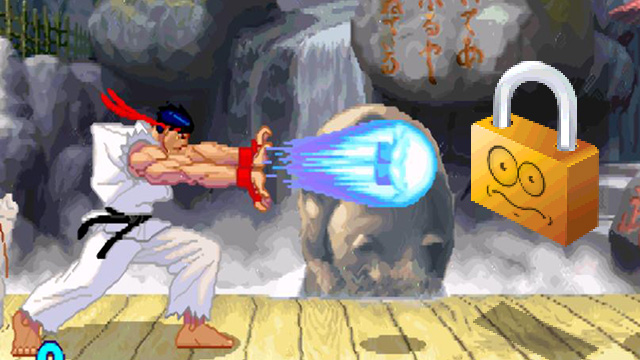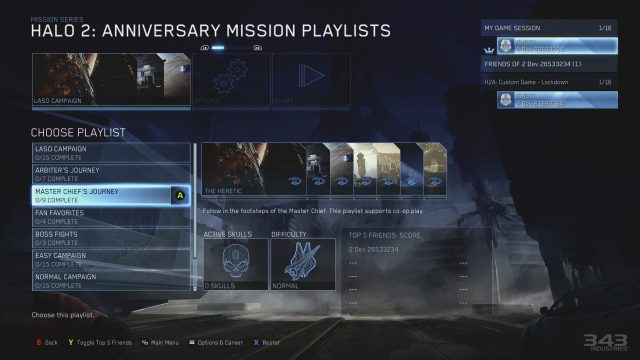
The Master Chief Collection launched earlier this week, a collection of classic Halo games that included an array of changes from the originals, such as improved graphics and customized, cross-game playlists. But there was another, more subtle change from the original Halo titles that I think more games should mimic well before being re-released as "remastered" collections.
As Sam Machkovech pointed out in his review, "all four full campaigns are unlocked the moment you boot HTMCC, meaning you can skip ahead to a favorite part of Halo 3, then find a friend and pound out a beloved Halo: CE mission in online co-op." It's a design decision that makes us wonder: why wasn't this the case when the Halo games were originally released? For that matter, why do developers "lock" game content in the first place?
The idea of locked content, which has to be "unlocked" through some sort of in-game achievement, is a peculiarity that games share with no other mass consumer art form. Books don't require you to read the prologue and author's note before diving in to Chapter 1. DVDs don't confirm that you fully comprehended the first act before letting you jump to your favorite scene in Act 2 (or make you suffer through the bad episodes of a TV show just to watch the good ones). Music albums don't require that you listen to songs in a certain order without the ability to skip around at will.
In games, though, we accept these kinds of restrictions without complaint. It's just accepted that you shouldn't be allowed to play level four until you've completed the first three levels. If you're not good enough or smart enough to beat level three? Oh well, I guess you won't get to experience the rest of the game you purchased. Maybe a friend can help you out?
Even worse, many games lock away the "real game" until you suffer through an unskippable tutorial or hide away entire playable characters and difficulty levels until you've already proven you can sit through the entire game once through. In some extreme cases, you can't even play a game's multiplayer modes until you've spent some time unlocking them through the single-player game.
It doesn't have to be this way, as Halo: The Master Chief Collection and its immediate unlocks show. Original campaigns aren't going anywhere, and we're not about to start skipping content by default. But there's no reason to prevent players from deciding how and when they can access whatever content is in a game—from levels and items to weapons and costumes—at the moment they first launch it.
The golden age of the code
This isn't all that radical of an idea when you look back at gaming history. In the 8- and 16-bit days, it was relatively common for developers to include level select codes, invincibility codes, "all weapon" unlock codes, and the like in games. Show me a gamer that didn't use the "idkfa" and "iddqd" codes in Doom or the "infinite money" code in SimCity 2000, and I'll show you a gamer that probably didn't get as much enjoyment as they could have out of those games. Some games went even further, leaving in "debug mode" codes that gave players total control over the game world with sometimes hilarious results. And after-market devices like the Game Genie or Pro Action Replay were available to add in this kind of functionality to many console games even if developers left it out.
In recent gaming generations, though, it's become more common for developers to squirrel away unlockable content as a kind of carrot spurring players along. You want all the characters for multiplayer fights in a Super Smash Bros. game? Sorry, you have to grind through dozens of single-player matches first. Want to play Diablo 3 on "Master" difficulty? Sorry, you have to work your way through an easier version of the game first, because... it's more fun that way? Why can't we just play these games how we want, when we want?

To be clear, I'm not arguing that games should simply descend into chaotic grab bags of content with no coherent organization. Games can and should still need to present missions, levels, quests, etc. in a logical, ordered progression with built-in limitations on character abilities and stats as players progress. My argument is that there should be some option—a code, a sub-menu checkbox, an on-screen prompt, whatever—for players to skip to the next portion of the game whenever they want, just as DVD owners can skip around the ordered scenes of a movie as they choose. And if a player wants to use a rocket launcher in the first level, rather than waiting for it to unlock it in level 9, why should the game tell them they can't?
A few caveats: first, this argument applies primarily to single-player games. For issues of competitive balance, it makes sense to not let players have complete control over the gameplay experience during online matches. I would argue, though, that the recent trend toward multiplayer modes that let players earn new classes, weapons, and other perks only by grinding through X matches or getting Y kills distorts the online competitive landscape more than a "flat" system with everything available from the get go.
I also wouldn't want this kind of system to get in the way of the idea of in-game Achievements, high scores, or other marks of skill that should only be earned "honestly," by playing the game as originally designed. Plenty of games already handle this situation, though, by disabling Achievements and high score postings when players use built-in cheats. The idea of unlocking everything immediately also doesn't apply to extra content that a developer chooses to sell for real-world money; that's another contentious discussion in and of itself.
The game is the reward
Even with these caveats, I've gotten a surprising (to me) amount of pushback when arguing against the idea of unlockable content in games, both in public and in private conversations with friends. The main counter-argument is that games are inherently and uniquely driven by a reward loop in ways other art forms are not. Locking certain parts of the game away, the argument goes, gives players more incentive to work through the content they do have access to. It makes the locked content that much more satisfying when it is finally available.
Personally, if the only reason you're playing a game is to unlock other parts of the game, then it's probably not a very good game. Players should want to play your game because the gameplay or the story is inherently fun or interesting, not because they'll earn some random virtual trinket or watch a completion counter tick up toward 100 percent. If that's really all you want out of a game, Clicker Heroes is available for free on your browser.
A related argument I often hear is that giving players this kind of power just encourages them to skip past the hard parts of a game without putting in the effort. If players are able to jump around and "cheat" the designers' intentions with ease, the argument goes, some of them won't be able to resist the temptation to flit through the game like a hummingbird with ADD. They will thereby cheat themselves out of enjoying the game as it's intended.
Frankly, I think most players understand what they're doing when they mess with a game's "intended" state. I'll go back again to Doom because it's rightly considered a classic that spawned the continuing popularity of the first-person shooter genre. The game is no less a classic even though players can easily jump between levels, unlock all weapons, get infinite ammo, achieve at-will invincibility, and even walk through walls and enemies with just a few keystrokes. On the contrary, the ability to mess around with the game's underlying structure in this way adds a whole new level of appreciation and fun for many players. Despite this, plenty of people still play the game straight through without unlocking items or levels before their time. Many are simply immune to the siren song of these codes.
If and when players do use those "instant unlock" abilities, they usually have a good reason. Maybe they were stuck on one extremely annoying and tedious portion of an otherwise great game. Maybe they played the game years ago and just want to get to "the good part" without wasting ten hours recreating a long-lost save file. Maybe they were just bored with the game as designed and wanted to spice things up a bit.
In any case, it's a choice I'm comfortable with people making for themselves. Locking away content in a game is nothing more than a developer's way of telling a player "you're not ready for that yet" or "you don't want to play it that way... trust us." If a game is really well designed, the developers should be able to trust that players can choose for themselves how they best want to experience that game world. It's past time that developers give players the option of taking the keys to those worlds for themselves, breaking open those locks that have hamstrung the game experience for too long.
I know I'm a bit of a maximalist on this, and plenty of people think giving the players this much control over the flow of a game is a recipe for disaster. Feel free to let me know your disagreements in the comments, and I'll respond to the best points in a future piece.
reader comments
236